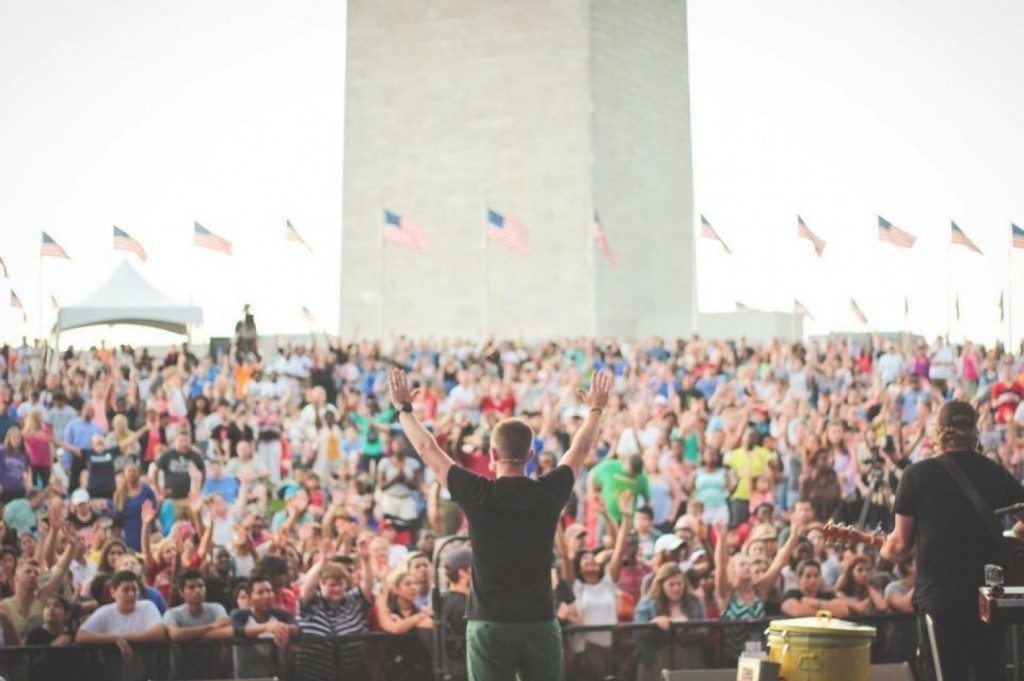
Revivals are an integral part of evangelical and charismatic Christianity, but the idea of what makes for revival is undergoing strain as evangelicalism grows more diverse and has less of a public presence in American society. In the Washington Post (July 13), Michelle Bornstein reports on one of the largest modern day revival events, Together, which gathered thousands of evangelicals at the Washington Monument and had “heavy social media branding, major music from hip-hop to folktronica to hard rock, and popular evangelists who know to keep their messages TED-talk short.” The event was the brainchild of 34-year-old evangelist Nick Hall, who wanted to bring together evangelicals in a public venue, just as Billy Graham crusades had done in the past. But today such a gathering had to deal with contemporary quandaries, such as how it would reflect evangelicals’ ethnic and theological diversity and the growing leadership role of evangelical women; whether Catholics, even such a prominent one as Pope Francis, should participate (the pontiff spoke to the crowd via a video connection); and, more pertinently, whether this public presence of evangelicals would advance evangelism or Christian influence. Bornstein reports that about half of the speakers for Together are non-white and one-third are women.
Bornstein cites church growth specialist Ed Stetzer as saying that Together is not like the Graham crusades in that the latter emphasizes its mission to convert non-Christians while the Washington event appealed to Christians for the need to be “reenergized and refocused.” The ways in which revival can mean different things to different Christians and has become decentralized is evident in the July issue of Charisma magazine, which is devoted to reports on recent outbreaks of revival in the U.S. and Latin America. 
Behind the generic label of nonreligion, one finds a variety of views and “multiple secularities,” suggesting that the religious nones are not a coherent group, according to researchers speaking at the conference “Approaching Nonreligion” that took place at the University of Zurich, Switzerland, from July 7–9, which RW attended. Due to the rise of unaffiliated […]
The percentage of Americans believing that churches and other religious institutions contribute to solving social problems has dropped significantly in recent years, according to a survey by the Pew Research Center. The survey finds that while a majority of Americans still say religious institution contribute either a “great deal” (19 percent) or “some” (38 percent) […]
The decision by Britain to pull out of the European Union in late June has been cited as having a wide range of political and economic ramifications, but “Brexit’s” impact may likewise have various unintended religious consequences, particularly regarding immigration and interfaith relations. The Tablet (July 2), a British Catholic magazine, looked at how Brexit […]
As in the rest of Europe, Poland is experiencing an upsurge in populist rightist groups and sentiment, with a measure of support from Polish church leaders, reports Commonweal magazine (July 8). The Polish church was in the spotlight in late July as it hosted Pope Francis and the World Youth Day, but there is considerable […]
The large number of Russian Christian immigrants in Israel are increasingly taking on an Israeli identity and embracing Hebrew language services, particularly Messianic Jews, writes Lisa Loden in East-West Church & Ministry Report (Summer). The Law of Return allowed waves of immigrants into Israel from the former Soviet Union if they could prove some Jewish […]
There is a growing interest in Sufism among Israeli Jews, often leading to new interfaith encounters that accompany this form of mystical Islam, according to the Washington Post (July 28). Recent years have seen the growth of whirling dervish practices as well as the rise of large-scale Sufi music festivals, Sufi study groups, and tours […]
The Islamic State (IS) is gradually dismantling its “caliphate,” but such a process of “de-sanctuarization” of the movement is likely to make it more decentralized and active in jihadist terrorist activity throughout the world, according to recent reports. The Terrorism Monitor (July 22), published by the Jamestown Foundation, reports that the Islamic State’s own leaders […]
The recent outbreak of self-immolation protests in the Tibetan movement for independence has been interpreted as nationalists’ rejecting of Buddhist teachings and the political authority of the Dalai Lama, but a new study finds Buddhism and its leader holding its relevance for this community. In the current issue of the journal Contemporary South Asia (Vol. […]
Even as other types of religious movements seem to attract more scholarly interest in recent years, the Jehovah’s Witnesses nevertheless continue to draw attention from researchers as a paradigmatic instance of Christian nonconformity and an enduring expression of organized millenarianism. Two new publications in recent month’s witness to this reality. Acta Comparanda (Subsidia III, €36 […]